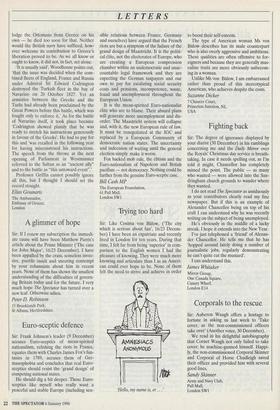Greek assistance
Sir: Professor Jasper Griffin introduces his review of the excellent recent book by C.M. Woodhouse on Rhigas Ferraios (Books, 16/23 December) with the sentence: `Greece, as we all know, was liberated from the Turkish yoke in the 1820s by the poet Byron and the British navy (at the battle of Navarino) with some help from a few Greeks.'
As it is not at all clear who this we refers to, I think it preferable to rely on C.M. Woodhouse's authority. What this 'distin- guished British philhellene' (Professor Grif- fin's words) has to say on the matter in his Greek War of Independence makes fascinat- ing reading. For one thing, during the long night of Ottoman occupation 'the Greeks themselves never so completely succumbed as to be incapable of revolt, sometimes local and spasmodic, sometimes not far short of general and organised, long before the his- toric rising of 1821'. In fact, 'the Turkish occupation had been punctuated by Greek revolts in almost every generation'.
For another thing, the eminent historian tells us, 'the achievement of independence was really the achievement of ordinary Greek people . . . As he makes clear, 'the Philiki Etaireia, the Phanariotes, the phil- hellenes, the clergy, the politicians, the amateur and professional soldiers, could none of them, singly or collectively, have brought to pass what the statesmen of Europe were determined to prevent [my emphasis] without the divine fire that had entered into the Greek people at the begin- ning of the nineteenth century'. Let us face it, Byron would not have been able to dis- lodge the Ottomans from Greece on his own — he died too soon for that. Neither would the British navy have sufficed, how- ever welcome its contribution to Greece's liberation proved to be. As we all know or ought to know, it did not, in fact, act alone.
`It is usually said', Woodhouse points out, `that the issue was decided when the com- bined fleets of England, France and Russia under Admiral Sir Edward Codrington destroyed the Turkish fleet in the bay of Navarino on 20 October 1827. Yet an armistice between the Greeks and the Turks had already been proclaimed by the Great Powers before this battle, which was fought only to enforce it.' As for the battle of Navarino itself, it took place because `Codrington showed plainly that he was ready to stretch his instructions generously in favour of the Greeks'. He had to pay for this and 'was recalled in the following year for having misconstrued his instructions. The speech from the throne at the next opening of Parliament in Westminster referred to the Sultan as an "ancient ally" and to the battle as "this untoward event".'
Professor Griffin cannot possibly ignore all this, but I thought I should set the record straight.
Elias Gounaris
The Ambassador, Embassy of Greece, London



















































 Previous page
Previous page